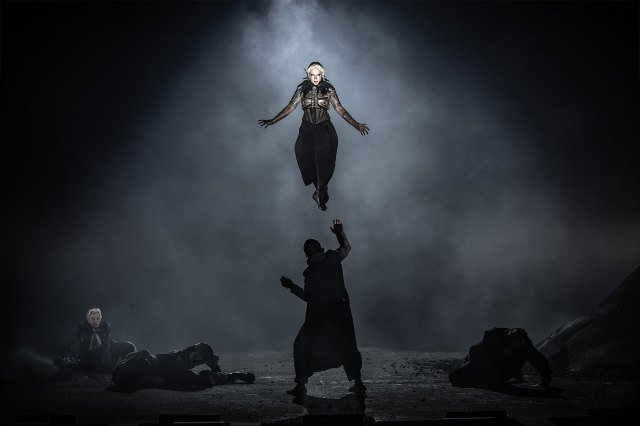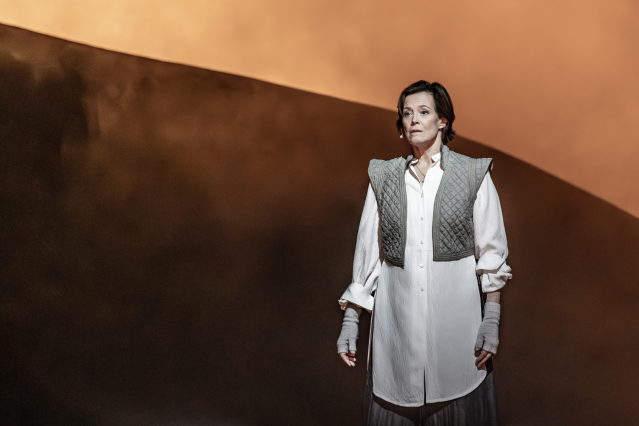Which way did the wind blow with The Tempest reviews?
Sigourney Weaver stars in the new production at Theatre Royal Drury Lane, directed by Jamie Lloyd

Jamie Lloyd’s production of The Tempest has allowed Shakespeare to storm back into Theatre Royal Drury Lane, decades after Gielgud proclaimed that the Bard would never find a home on its historic stage when he starred in the same play. Andrew Lloyd Webber, never one to refuse a challenge, asked Lloyd to rectify the situation, with The Tempest being the first of two productions Lloyd will bring to the venue (followed by Much Ado About Nothing next year).
But what did the critics think? You can read their reviews below:
Sarah Crompton, WhatsOnStage
★★
“It looks dramatic, in what has become Lloyd’s signature style of greys and blacks. Soutra Gilmour has decided to present the enchanted island where Prospero spends her time in exile after being overthrown as Duchess of Milan as a dark slag heap. It looks like a scene from a dystopian sci-fi movie scoured by clouds of constantly billowing smoke, and shadows.”
“Mason Alexander Park’s Ariel (quite the best thing in the entire production) emerges out of blackness on wires in the air above, surrounded by yellow clouds, or sweeps across the dirt wrapped in a diaphanous veil, singing with an air of threat. Forbes Masson’s Caliban lumbers around in a leather jockstrap looking as if he has dropped in from the Sean Connery not-so-classic Zardoz. Miranda (an impressive Mara Huf) looks like a castaway from Dune.”
Arifa Akbar, The Guardian
★★★★
“Lloyd does not eke out any deeper meanings from the text, but does present Prospero’s magical world with a stylised quality that carries touches of Peter Brook’s performance theatre and the avant-gardism of Lindsay Kemp. Characters move in gestural ways, at a stately pace, retreating to the back of the set to stand in heroic silhouette when they are not part of the action. Trinculo (Mathew Horne) and Stephano (Jason Barnett), who feature in the subplot of comical insurgency, behave like avant garde clowns too. Some of the ritualistic circling is overdone at the end, but still it has the feel of Greek theatre in outer space.”
Andrzej Lukowski, Time Out
★★★
“In a play that has had a fair bit pruned to get it to a spare two hours 15 minute runtime, it feels like Lloyd has lavished a lot of time on the comedy subplot. The hijinks relating to the monstrous Caliban (depicted as a sort of grotesque overgrown baby by Forbes Masson) and the shipwrecked piss artists Stefano (Jasoin Barnett) and Trinculo (Matthew Horne) feels both overly prominent and somewhat generic – a lot has been written and argued about Caliban as a sort of post-colonial figure, but here he’s just a kind of kinky doofus.”

Sarah Hemming, Financial Times
★★★
“Weaver’s Prospero, a mournful, stately presence, is constantly onstage observing her handiwork unfold: a parent hovering in the background; a woman watching the men who have wronged her as they play into her hands. But she is largely static and her delivery is perplexingly one-note: she seems implacable, almost emotionally detached. That may be the reading — Prospero as the still eye of the storm — but it means that some of the play’s great poetry doesn’t sing out and it flattens any sense of battle or reflection within the character over the path she has chosen. There’s fabulous work from Park as Ariel, an eerie, ethereal being with a superb singing voice, whose resentment at being enslaved burns across the stage. Selina Cadell brings warmth and humanity to the good courtier Gonzalo. And there’s a drive to revisit the play’s strangeness and teaching for our times. But overall, it feels like something gets lost at sea.”
Dominic Cavendish, The Telegraph
★★★
“It becomes a chore to look on impassive composure, with Prospero’s clean, unisex costume (a long white shirt, not a flowing robe) also draining interest too. There’s no staff for this self-made wizard to wield, though much woodenness in her delivery – an even-keel approach to the verse that verges on the automaton. When Prospero exclaims “I had forgot that foul conspiracy!”, well, I’ve heard people fret that they’ve left their washing out with more spontaneous angst.”
Nick Curtis, Evening Standard
★★★
“An interesting thematic suggestion that Prospero’s island is a place of rebirth gets lost amid the sonorous intonation and tedious comic relief. For all its stark visual boldness, this is a curiously old-fashioned take.
“Designer Soutra Gilmour dresses the cast in shades of blue and grey and a collage of styles, with a weird fondness for fingerless gloves. She fills the loftily exposed stage with more gorgeous silks that suggest shimmering water or pregnant clouds above black, volcanic dunes. It made me think of… well, Dune.“
Clive Davis, The Times
★★
“Park’s Ariel, hoisted high over the stage, provides a rare burst of visual splendour. Otherwise, as the colours of the backdrop and Gilmour’s costumes are so muted, Lloyd’s vision of a magical kingdom soon grows monotonous. Confusing too: the heavily cut script, laced with surging, Hans Zimmer-like background music, gallops along at such a pace that newcomers are likely to struggle to decipher what exactly is going on as the various contingents mooch about the strange new land.”


















